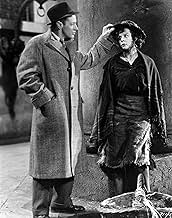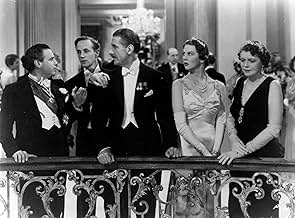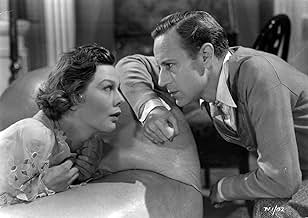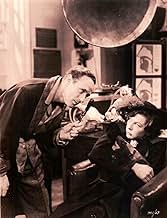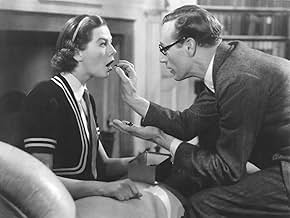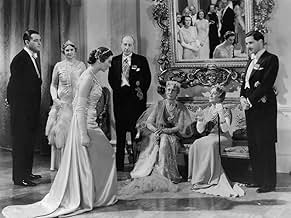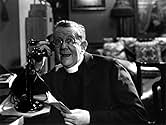CALIFICACIÓN DE IMDb
7.7/10
10 k
TU CALIFICACIÓN
Un experto en fonética y dicción apuesta a que puede enseñarle a una florista a hablar inglés correctamente y hacerse pasar por una dama de la alta sociedad.Un experto en fonética y dicción apuesta a que puede enseñarle a una florista a hablar inglés correctamente y hacerse pasar por una dama de la alta sociedad.Un experto en fonética y dicción apuesta a que puede enseñarle a una florista a hablar inglés correctamente y hacerse pasar por una dama de la alta sociedad.
- Dirección
- Guionistas
- Elenco
- Ganó 1 premio Óscar
- 4 premios ganados y 5 nominaciones en total
Leueen MacGrath
- Clara Eynsford Hill
- (as Leueen Macgrath)
Irene Browne
- Duchess
- (as Irene Brown)
Cathleen Nesbitt
- A Lady
- (as Kathleen Nesbitt)
Opiniones destacadas
10ted puff
Perfect cinema. That was my reaction when I first saw Pygmalion, the first of 50 viewings and counting, and I still think so. Who could not fall in love with Leslie Howard, one of our greatest actors, so tragically assassinated in the Second World War? Wendy Hiller IS Eliza. The cast is flawless. The script... words fail me, for George Bernard Shaw was a genius, he did not simply adapt his play for the screen, it is so good that it is like it's happening before your eyes. My God, after seeing this is there anyone out there who thinks 'My Fair Lady', the slowest film musical on record, is the best screen version of Shaw? If they do, they are mad.
That film moves me not one jot, everything is so clean, so smug, so unreal. Here we see poverty, but also hope. These are not actors and actresses moving through the sets garbed in Cecil Beaton, but real people, real suffering, but humanity lights every scene like a beacon. The unbearably moving scenes of Eliza capturing society at the ball, the irresistible waltz, watch this with no tears in your eyes, I dare you. Halliwells Film Guide calls this 'one of the most heartening and adult British films of the thirties'. Too right. I cannot fault this film, it is priceless. By the way, I saw 'My Fair Lady' on stage recently, and it's miles better than the film version. Warner Bros really let Shaw down, and it's impossible to put it right. But this...well it is a big compensation. And I don't miss the songs one little bit.
There are so many classic scenes I can't pick any out. Of course viewers will spot that it was 'updated' to 1938, and the original play set in the Edwardians. That doesn't hurt it at all, 'polite' society didn't change much in the intervening years and gives the play an added 'contemporary' edge. Please, please, please see this film. You will be gripped.
That film moves me not one jot, everything is so clean, so smug, so unreal. Here we see poverty, but also hope. These are not actors and actresses moving through the sets garbed in Cecil Beaton, but real people, real suffering, but humanity lights every scene like a beacon. The unbearably moving scenes of Eliza capturing society at the ball, the irresistible waltz, watch this with no tears in your eyes, I dare you. Halliwells Film Guide calls this 'one of the most heartening and adult British films of the thirties'. Too right. I cannot fault this film, it is priceless. By the way, I saw 'My Fair Lady' on stage recently, and it's miles better than the film version. Warner Bros really let Shaw down, and it's impossible to put it right. But this...well it is a big compensation. And I don't miss the songs one little bit.
There are so many classic scenes I can't pick any out. Of course viewers will spot that it was 'updated' to 1938, and the original play set in the Edwardians. That doesn't hurt it at all, 'polite' society didn't change much in the intervening years and gives the play an added 'contemporary' edge. Please, please, please see this film. You will be gripped.
George Bernard Shaw was very wary about allowing his movies to be filmed. He had seen movies by other famous writers and dramatists thoroughly rewritten for the screen, and thoroughly wrecked as a result. So the greatest English speaking dramatist of the 20th Century held off from any involvement with motion pictures into the 1930s. Then he met Gabriel Pascal. Mr. Pascal was thoroughly honest. He admitted he did not have a cent to his name, but he also admitted a desire to produce all of Shaw's major plays as movies exactly as Shaw wanted them shown. Shaw was impressed and made an agreement giving Pascal a monopoly on all his plays for movie making. In return, Shaw was to be involved in the productions.
It turned out to be a remarkably small but fruitful partnership. Of the over fifty plays of Shaw's output (not to mention several novels), only four were produced by Pascal. They are PYGMALION (1938), MAJOR BARBARA (1940), CAESAR AND CLEOPATRA (1945), and ANDROCLES AND THE LION (1952). They are all good films, and the first three have reason to be considered great. Shaw died in 1950, so he was not there to see (after Pascal's death) the decline in standards of films based on his plays - such as Otto Preminger's brave attempt at ST. JOAN, and the wretched THE MILLIONAIRESS with Peter Sellers and Sophia Loren.
PYGMALION was a good choice for the first of the series, probably as it was the most popular comedy by Shaw. It was also one of the most controversial plays because of the problem that bedeviled the original production of 1914 and has effected it ever since: how is it supposed to end? Will Higgins and Eliza put aside their differences and admit they love each other and come together at the end?
Shaw clearly felt that Pygmalion Higgins and Galatea Doolittle were doomed not to end in an embrace. He wanted the audience to be left thinking of Eliza as one of the 20th Century's "New Women", who is independent and strong, not just a piece of weak clay to be kneaded by an artistic and overpowering male ego. In the dialog (which he uses in the play and in the movie script) Shaw insisted that Eliza favors Freddy Eynesford-Hill over Higgins because Freddy is a weakling. All her life she has been dominated by strong men (first her father Alfred, then Higgins, and (although he is kinder) Col. Pickering). Freddy is the first one to show his need for guidance and help - he is shown at the beginning of the play as little better than a servant for his mother and sister, getting them a cab in the rain.
But Shaw did not have an easy time with this view. The play was produced by Sir Herbert Beerbohm Tree, one of England's leading stars of the Edwardian and Georgian stage (he was brother of critic and writer Sir Max Beerbohm, and his son David Tree plays Freddy in this film version). Beerbohm Tree felt that there was a real romance between Higgins and Doolittle, and insisted on playing it like that, to the point of throwing a bouquet of flowers to Eliza as she is leaving. Shaw was furious at this, and wrote a seven page afterword which (mercifully) is never read at productions. I saw Peter O'Toole as Higgins in 1988, with Amanda Plummer as Eliza, Lionel Jeffries as Pickering, and the late Sir John Mills as Alfred Doolittle, and the play ended on the right note of uncertainty wanted. It did not have a thin, bearded actor as Shaw coming out to read the afterward.
In this afterward, Shaw said that Eliza learns from the brutal Higgins he is a confirmed bachelor devoted to his mother (an interesting psychological point there that another play could have been built from). She does marry Freddy, and (as Higgins had sneered) things are tough - though not due to Freddy being unfaithful but that he is not very sharp. But Col. Pickering helps them set up a florist business, and after awhile it prospers. Clara Eynesford-Hill (whose character is barely developed in the play or on the screen) does become a friend of the socialist and novelist H.G.Wells. Alfred Doolittle, after getting speech lessons from Higgins, becomes a popular speaker and writer on social issues. As you can see, Shaw's anger got the better of him.
Shaw was convinced by Pascal (for business reasons) to soften the conclusion, by showing Eliza fleeing Higgins in Freddy's car, Higgins walking alone through London to his home, slamming the door of his study, causing the phonograph to go on, playing a record of Eliza's old voice talking. As he sits with head in his hands, Eliza shows up at the door, turns off the machine, and starts talking as on the record. But Higgins realizes it is her, although he does not turn around. He sits back with a happy, if smug expression on his face, pulls his hat down over his eyes, and says (shot from his back to Eliza), "Where the devil are my slippers, Eliza?" It is suggestive of a meeting of two souls, but it leaves it still in the air. It is superior to that idiotic afterward.
George Bernard Shaw won his only Oscar for a screenplay for PYGMALION. It is a brilliant play and script, given top notched direction by Anthony Asquith and Leslie Howard, with Howard giving one of his three top performances in it as Higgins - ably matched by Wendy Hiller as Eliza and Wilfred Lawson as Doolittle. And it's conclusion was so good, it was kept by Learner and Lowe for MY FAIR LADY on stage and screen.
It turned out to be a remarkably small but fruitful partnership. Of the over fifty plays of Shaw's output (not to mention several novels), only four were produced by Pascal. They are PYGMALION (1938), MAJOR BARBARA (1940), CAESAR AND CLEOPATRA (1945), and ANDROCLES AND THE LION (1952). They are all good films, and the first three have reason to be considered great. Shaw died in 1950, so he was not there to see (after Pascal's death) the decline in standards of films based on his plays - such as Otto Preminger's brave attempt at ST. JOAN, and the wretched THE MILLIONAIRESS with Peter Sellers and Sophia Loren.
PYGMALION was a good choice for the first of the series, probably as it was the most popular comedy by Shaw. It was also one of the most controversial plays because of the problem that bedeviled the original production of 1914 and has effected it ever since: how is it supposed to end? Will Higgins and Eliza put aside their differences and admit they love each other and come together at the end?
Shaw clearly felt that Pygmalion Higgins and Galatea Doolittle were doomed not to end in an embrace. He wanted the audience to be left thinking of Eliza as one of the 20th Century's "New Women", who is independent and strong, not just a piece of weak clay to be kneaded by an artistic and overpowering male ego. In the dialog (which he uses in the play and in the movie script) Shaw insisted that Eliza favors Freddy Eynesford-Hill over Higgins because Freddy is a weakling. All her life she has been dominated by strong men (first her father Alfred, then Higgins, and (although he is kinder) Col. Pickering). Freddy is the first one to show his need for guidance and help - he is shown at the beginning of the play as little better than a servant for his mother and sister, getting them a cab in the rain.
But Shaw did not have an easy time with this view. The play was produced by Sir Herbert Beerbohm Tree, one of England's leading stars of the Edwardian and Georgian stage (he was brother of critic and writer Sir Max Beerbohm, and his son David Tree plays Freddy in this film version). Beerbohm Tree felt that there was a real romance between Higgins and Doolittle, and insisted on playing it like that, to the point of throwing a bouquet of flowers to Eliza as she is leaving. Shaw was furious at this, and wrote a seven page afterword which (mercifully) is never read at productions. I saw Peter O'Toole as Higgins in 1988, with Amanda Plummer as Eliza, Lionel Jeffries as Pickering, and the late Sir John Mills as Alfred Doolittle, and the play ended on the right note of uncertainty wanted. It did not have a thin, bearded actor as Shaw coming out to read the afterward.
In this afterward, Shaw said that Eliza learns from the brutal Higgins he is a confirmed bachelor devoted to his mother (an interesting psychological point there that another play could have been built from). She does marry Freddy, and (as Higgins had sneered) things are tough - though not due to Freddy being unfaithful but that he is not very sharp. But Col. Pickering helps them set up a florist business, and after awhile it prospers. Clara Eynesford-Hill (whose character is barely developed in the play or on the screen) does become a friend of the socialist and novelist H.G.Wells. Alfred Doolittle, after getting speech lessons from Higgins, becomes a popular speaker and writer on social issues. As you can see, Shaw's anger got the better of him.
Shaw was convinced by Pascal (for business reasons) to soften the conclusion, by showing Eliza fleeing Higgins in Freddy's car, Higgins walking alone through London to his home, slamming the door of his study, causing the phonograph to go on, playing a record of Eliza's old voice talking. As he sits with head in his hands, Eliza shows up at the door, turns off the machine, and starts talking as on the record. But Higgins realizes it is her, although he does not turn around. He sits back with a happy, if smug expression on his face, pulls his hat down over his eyes, and says (shot from his back to Eliza), "Where the devil are my slippers, Eliza?" It is suggestive of a meeting of two souls, but it leaves it still in the air. It is superior to that idiotic afterward.
George Bernard Shaw won his only Oscar for a screenplay for PYGMALION. It is a brilliant play and script, given top notched direction by Anthony Asquith and Leslie Howard, with Howard giving one of his three top performances in it as Higgins - ably matched by Wendy Hiller as Eliza and Wilfred Lawson as Doolittle. And it's conclusion was so good, it was kept by Learner and Lowe for MY FAIR LADY on stage and screen.
While My Fair Lady was a tremendous film which is a pleasure to watch and rewatch, Pygmalion is the true cinematic version of Shaw's work and this version is brilliant. While I still have mixed feelings about the Henry-Eliza relationship and the play ending, it has to be said that the two leads here are perfect for their roles. There were not many British actors better than Howard at the time for this type of thing, and Wendy Hiller never disappointed her audience once in her long career. A good film full of detail and feeling. The one sticking point is the weak and feeble Freddie who at least was given a personality in MFL. Here you can't wonder that Eliza is so quick to discard his attentions. A film which should be celebrated and treasured more in the UK than it is.
After seeing Leslie Howard as Henry Higgins, there is no way I could find Rex Harrison half as appealing, with his chanting/singing, in My Fair Lady. Leslie Howard simply is Henry Higgins, and if he seems unappealing and unlikable, that's because he's supposed to be unappealing and unlikable -- Henry Higgins is not a nice man. Howard does an incredible job with the role, and Wendy Hiller's Eliza puts Audrey Hepburn, as lovely as she is, to shame.
If George Bernard Shaw thought that Howard's interpretation of his play was good, then who are we to argue?
If George Bernard Shaw thought that Howard's interpretation of his play was good, then who are we to argue?
Even if I had not yet seen this film I'd have had good reason to assume its merit simply because George Bernard Shaw, as cantankerous and protective of his work as he was, liked it. But I have seen it, many times, and that only validates that conclusion.
Leslie Howard not only starred in it but co-directed as well, and accomplished both magnificently. His rapid-fire intensity, conveying the true overbearing Higgins using Eliza as if she were "a block of wood," to quote, to be sawed, hewn, nailed, drilled and pounded into an object to his liking, is wonderfully complemented by Wendy Hiller's Eliza, bringing us to understand the full range of her growth from the depths of her imprisonment in the class of the street vendor barely escaping mendacity by selling flowers to a real princess, not by royal birth, but by her strength and accomplishment. Higgins may like to claim credit for her transformation; but it's Eliza who really made it happen.
There's a lot said here comparing Pygmalion to My Fair Lady. That's really a classic apples-and-oranges fallacy. Musical theatre is an entirely different art form, with a different goal. It's clear that if this interpretation of Pygmalion had been duplicated with songs and dances tacked on, it would have been horrible; yet My Fair Lady is a triumph of its art. It's often called a musical adaptation. That's mistaken; it's "based on" Pygmalion. The nature of musical theatre requires a different approach. To evaluate either by the standards of the other is a waste of time and thought.
Shaw would undoubtedly have hated MFL; his revulsion for Romanticism and the failure of The Chocolate Soldier, the operetta based on Arms and the Man, would guarantee that. MFL is not a musical Pygmalion, and should never be mistaken for one.
It is a great tribute to the genius of George Bernard Shaw and his best-known play that it could spawn both this artful and powerful movie version and a greatly different and beautiful musical as well.
Leslie Howard not only starred in it but co-directed as well, and accomplished both magnificently. His rapid-fire intensity, conveying the true overbearing Higgins using Eliza as if she were "a block of wood," to quote, to be sawed, hewn, nailed, drilled and pounded into an object to his liking, is wonderfully complemented by Wendy Hiller's Eliza, bringing us to understand the full range of her growth from the depths of her imprisonment in the class of the street vendor barely escaping mendacity by selling flowers to a real princess, not by royal birth, but by her strength and accomplishment. Higgins may like to claim credit for her transformation; but it's Eliza who really made it happen.
There's a lot said here comparing Pygmalion to My Fair Lady. That's really a classic apples-and-oranges fallacy. Musical theatre is an entirely different art form, with a different goal. It's clear that if this interpretation of Pygmalion had been duplicated with songs and dances tacked on, it would have been horrible; yet My Fair Lady is a triumph of its art. It's often called a musical adaptation. That's mistaken; it's "based on" Pygmalion. The nature of musical theatre requires a different approach. To evaluate either by the standards of the other is a waste of time and thought.
Shaw would undoubtedly have hated MFL; his revulsion for Romanticism and the failure of The Chocolate Soldier, the operetta based on Arms and the Man, would guarantee that. MFL is not a musical Pygmalion, and should never be mistaken for one.
It is a great tribute to the genius of George Bernard Shaw and his best-known play that it could spawn both this artful and powerful movie version and a greatly different and beautiful musical as well.
¿Sabías que…?
- TriviaThe scene in which Eliza accidentally swallows a marble while having an elocution lesson does not appear in the original play. During rehearsals for this scene, a pained expression came over Wendy Hiller's face. When she spat out the marbles she had in her mouth, she said, "Leslie, I've swallowed one!" to which Leslie Howard replied, "Never mind, there are plenty more." This caused such amusement among the watching crew that it was added to the movie and to its musical version, Mi bella dama (1964).
- ErroresAfter the ball when Mrs. Pearce serves Professor Higgins his tea, the shadow of the camera can be seen in the bottom left, moving back across his blanket.
- Citas
Eliza Doolittle: Walk? Not bloody likely. I'm going in a taxi.
- Créditos curiososOpening credits prologue: PYGMALION WAS A MYTHOLOGICAL CHARACTER WHO DABBLED IN SCULPTURE. HE MADE A STATUE OF HIS IDEAL WOMAN-GALATEA. IT WAS SO BEAUTIFUL THAT HE PRAYED THE GODS TO GIVE IT LIFE. HIS WISH WAS GRANTED.
BERNARD SHAW IN HIS FAMOUS PLAY GIVES A MODERN INTERPRETATION OF THIS THEME.
- Versiones alternativasThis film was made a year before the Hays Office gave Clark Gable permission to say "Frankly, my dear, I don't give a damn", so while in the British prints of this film Leslie Howard often utters the word, in the American prints the word "damn" is replaced by either "hang" or "confounded".
- ConexionesFeatured in Metro-Goldwyn-Mayer's Big Parade of Hits for 1940 (1940)
Selecciones populares
Inicia sesión para calificar y agrega a la lista de videos para obtener recomendaciones personalizadas
- How long is Pygmalion?Con tecnología de Alexa
Detalles
- Fecha de lanzamiento
- País de origen
- Idioma
- También se conoce como
- Pygmalion
- Locaciones de filmación
- Pinewood Studios, Iver Heath, Buckinghamshire, Inglaterra, Reino Unido(studio: made at Pinewood Studios England)
- Productora
- Ver más créditos de la compañía en IMDbPro
Taquilla
- Presupuesto
- GBP 87,000 (estimado)
- Tiempo de ejecución1 hora 36 minutos
- Color
- Relación de aspecto
- 1.37 : 1
Contribuir a esta página
Sugiere una edición o agrega el contenido que falta


